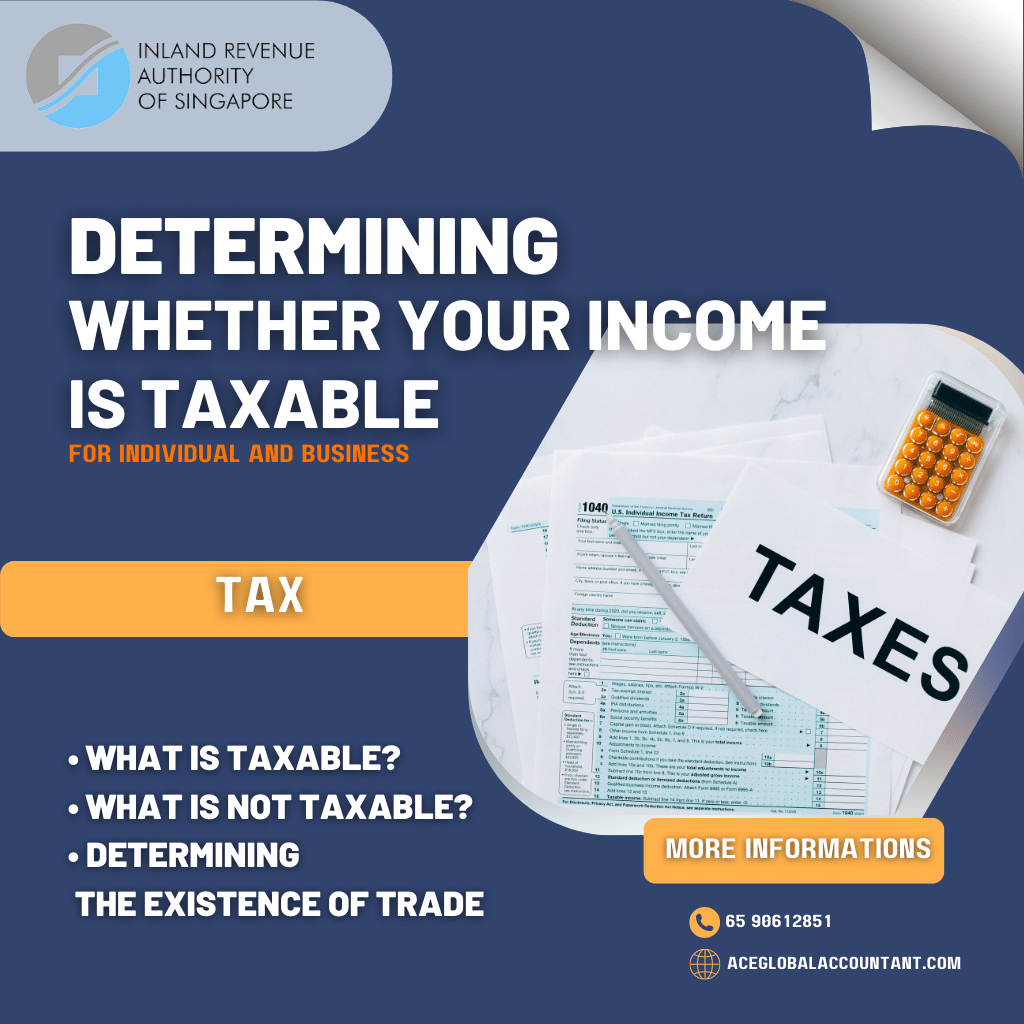 0
0
SHOPPING CART
 Generally, any income earned in Singapore or from foreign sources is taxable.
Generally, any income earned in Singapore or from foreign sources is taxable.
Your company will have to pay taxes on any taxable income that is:
Accrued in Singapore, or
For example, the income from a business carried on in Singapore is regarded as accrued in or derived from Singapore.
According to Singaporean tax law, taxable income is defined as:
Claiming deductions such as business expenses, capital allowances and reliefs can help reduce your taxable income, leading to lower taxes.
Income Received in Singapore from Outside Singapore
Income from outside of Singapore is considered to be received in Singapore when it meets the criteria under Section 10(25) of the Income Tax Act 1947. This includes income that is:
Section 10(25) of the Singapore tax code applies to foreign income received by individuals who are residents of Singapore or by entities located in Singapore.
Non-resident individuals and foreign businesses not based in or operating from Singapore can send their foreign income to Singapore without paying taxes on that income.
A key point to remember for foreign income is that it is not considered as being received in Singapore immediately when it is reinvested back into another country – this is an administrative concession. So, what does this mean for taxes? It means that the taxation of the foreign income is deferred until the investment is sold and the money (or proceeds) are brought into Singapore.
If the foreign-sourced income is subject to tax in Singapore and overseas, tax reliefs may be available to alleviate the double taxation suffered. To learn more about tax reliefs on foreign income, please click here.
Capital Gains
Gains from the capital are not taxed. These consist of:
Income Exempted from Tax
The Income Tax Act of 1947 specifically exempts some forms of income from taxation, subject to some restrictions. These consist of the following:
The Income Tax Act of 1947 doesn’t define the term “trade.” It is a factual issue as to whether a trade is being conducted. A few things are considered while figuring out whether a transaction exists.
No single aspect is conclusive for assessing if a trade exists; all of the factors are taken into account.
1. Nature of Subject Matter
The term “trading” is typically used to describe the buying and selling of assets or property. Some items, such as commodities or manufactured goods, are commonly traded, while others are less likely to be considered for trading, such as antiques or works of art.
2. Length of Ownership
The holding period is the timeframe during which an asset is held. The shorter the holding period, the more likely the asset will be regarded as held for trading.
3. Frequency of Transactions
A pattern of similar transactions is a stronger indication of trading than a single transaction.
4. Supplementary Work
This refers to additional work done on the asset/property to make it more marketable or extra effort made to find or attract purchasers. If this is done, it is more likely that the subsequent disposal will be regarded as trading.
5. Circumstances of the Realisation
Some circumstances may not be as indicative of trading (for example, if a company is forced to sell a property due to compulsory acquisition, an urgent need for cash, or the threat of foreclosure by creditors).
6. Motive
This refers to the intention to trade at the time of acquiring the asset/property.
7. Mode of Financing
The term “short-term financing” refers to the financing of an asset/property with a loan that is intended to be paid back within a shorter amount of time than a long-term loan. This type of financing is more indicative of trading than long-term financing. When considering short-term financing for an asset/property, the company’s financial position and ability to hold on to the property are important factors to take into consideration.
8. Other Factors
Other Factors:
To learn more about Singapore incorporation, economy, banking, etc., feel free to call/WhatsApp us at +65 90612851 or email us at aceglobalacct@gmail.com. Alternatively, you may leave us a reply using our contact form below.
Keep in touch to receive the latest listing, news updates and special offers delivered directly to your inbox.
